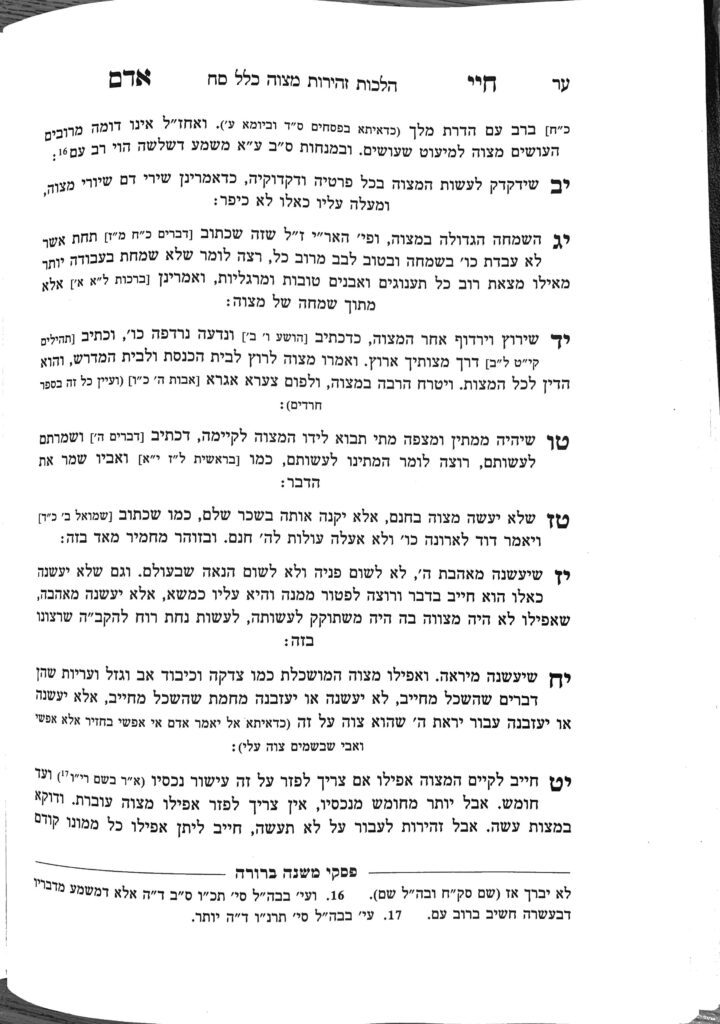We are continuing in siman 11, discussing the concept of b’rov am hadras melech. Yesterday, we mentioned a psak by Rav Moshe regarding two aveilim who have a chiyuv to daven for the amud. Rav Moshe paskened that they should not separate into two minyanim, and they will split the davening. (If the shul already has two standard, established minyanim, they should split up.) Rav Moshe’s psak is consistent with the Shulchan Aruch in siman 90 which said one should daven in the shul with the larger tzibbur, due to the concept of b’rov am. Reb Moshe also points out that often, when minyanim are split, one minyan ends up in another room, and it loses the advantage of kedushas beis haknesses. Rav Moshe concludes that the advantages of b’rov am gained by remaining together will enhance the tefillos recited, and that advantage is a ilui for the neshama akin to davening for the amud.
Rav Moshe Sternbach was asked a similar question and gave a similar teshuva. He adds that if it is clear that those with a chiyuv are upset, doing chesed with the individual is also an advantage, and since b’rov am is not a chiyuv gamur, one may create two minyanim. However, he concludes that it is more appropriate to remain together.
The scenario he is discussing is the minhag to daven the Shabbos before the yahrzeit, where the primary minhag is to daven mussaf. There is no source for this minhag, so he concludes it would be more appropriate to remain together. It would seem that if two people share the same yahrzeit, where there are clear sources for the minhag to daven on for the amud on the actual day, it would be appropriate to do the chesed and create two minyanim. Rav Moshe would still hold that it is more appropriate to keep the minyan together.
We have discussed previously situations of conflict between b’rov am and zrizin makdimin. The Gemara in Rosh Hashanah says that Hallel is recited as part of Shacharis because of zrizin makdimin, so it appears that zrizin makdimin would take precedence over b’rov am.
B’rov am does not only apply to doing a mitzvah, but to witnessing it as well. The Gemara says that people would gather to watch the kohanim perform the avodah due to the concept of b’rov am.
To summarize, we have multiple scenarios of b’rov am:
- 4. Multiple people involved in different stages of the mitzvah, as we learned from the Gemara in Yoma about tenufah (shiur 1425);
- One person performing the mitzvah but with many people watching, such as the avodah of the kohanim discussed above;
- One person reciting a bracha to be motzi others, such as kiddush, birchas hanehenin and so on;
- Multiple people performing the same mitzvah simultaneously, such as kiddush levana.
We have learned that if a group has a choice between one person rectiing kiddush or everyone reciting it on their own, we learned that the Tosfos Shabbos holds its more appropriate for one person to recite kiddush for everyone, and the Olas Shabbos holds it is more appropriate for every person to recite their own kiddush (see shiur 1409).
In conclusion, we see that there are many possible scenarios and different advantages which need to be weighed. Certainly, we see how much Chazal valued Klal Yisroel doing mitzvos together. If one has a practical shailah, they should ask a rav.
Summary
There are multiple scenarios of b’rov am:
- Multiple people involved in different stages of the mitzvah;
- One person performing the mitzvah but with many people watching;
- One person reciting a bracha to be motzi others;
- Multiple people performing the same mitzvah simultaneously.
When two aveilim have a chiyuv, if the shul only has one minyan, they should preferably remain with the minyan. If they will be upset, many shuls will split into two minyanim. Reb Moshe holds it is still preferable to stay together and divide the davening amongst them.



